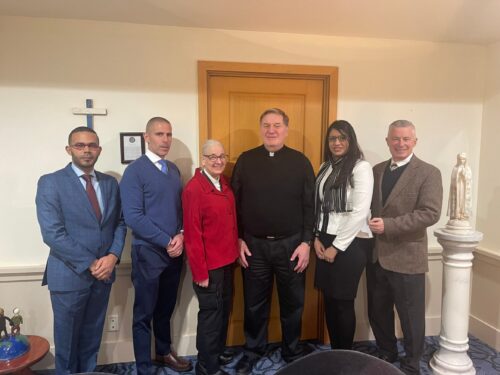
NEWARK — In times of personal crisis, Catholics often turn to their parish priest for help. But in the Archdiocese of Newark, the clergy will soon be doing more than lending a sympathetic ear.
Cardinal Joseph Tobin and former New Jersey Gov. Jim McGreevey are teaming up to establish a program in which priests will be trained to recognize the signs of opioid addiction and steer the troubled folks to treatment — within 48 hours.
McGreevey serves as chairman and executive director of NJ Reentry Corporation (NJRC) — a nonprofit established in 2014 that helps formerly incarcerated people reenter society and find jobs — and his organization recently signed a memorandum of understanding with the archdiocese to begin coordinating services.
The initiative will officially begin on July 1. The archdiocese has 212 parishes and serves approximately 1.3 million Catholics in four counties.
The first step will take place when NJRC conducts a two-hour training session on Zoom on June 22 for priests to learn to recognize signs of addiction.
According to the American Society of Anesthesiologists, the signs include: lack of interest in activities; refusal to bathe, change clothes, or brush teeth; quick change of mood; missing important appointments; and being either overly tired or overly energetic.
The program is needed, said Cardinal Tobin, who noted that the opioid epidemic gripping the U.S. has hit New Jersey especially hard. As an example, he pointed to a statistic — approximately 3,000 people in the state have died in recent years from drug overdoses relating to opioids, including heroin and fentanyl.
“The archdiocese recognizes the need for greater resources and support for adults struggling with opiate addiction who often turn to a parish seeking help,” Cardinal Tobin said. “This partnership between NJRC and the archdiocese will provide an opportunity for our brothers and sisters to receive addiction treatment when in critical need.”
The faster the better, McGreevey said, explaining the 48-hour timetable. “When you have people who want to take that step, who want to change, you have to move as quickly as you can to get them the help they need,” he said.
While parishioners with addiction issues (or their friends or relatives) can certainly approach a priest for advice, in some cases it will be the priest who approaches the addict to offer help.
The goal isn’t to turn priests into clinical directors, McGreevey said. Rather, the clergy would serve as facilitators. “When people have issues, or have family members with issues, they often don’t know where to turn or who to call. But they do know their church pastor. They know their priest,” he said.
“Priests will be able to give people a card with a phone number. NJRC has relationships with addiction treatment providers that adhere to clinical best practices,” McGreevey added.
Robert Carter, NJRC’s chief operating officer, will be responsible for putting the people in touch with clinical professionals for evaluation.
The services will be personalized according to the needs of the individual, McGreevey said. In addition to creating a personalized long-term treatment plan, the possible options could include detoxification, withdrawal management, induction of anti-craving medications to aid in treating opioid substance abuse, and residential or outpatient treatment.
In some cases, individuals will be enrolled in NJRC’s Employment Orientation, a program that teaches work skills and conducts job-readiness workshops.
NJRC will document its services through a database and will archdiocese.
Father Timothy Graff, secretary for parish mission and vitality for the archdiocese, said parishes can play a key role in helping people overcome addiction.
“The basic idea behind a partnership is so often when people are dealing with addiction issues or have family members living with addiction, the question is where can they turn? And what New Jersey Reentry has seen with their work with people coming out of the penal system is the important role that the community plays,” Father Graff explained.
McGreevey credited Cardinal Tobin with inspiring the archdiocese-NJRC partnership.
“The cardinal recognizes that when people are ready for treatment, it’s important to have the supportive power of the faith community,” McGreevey said.
Having the program begin on July 1 is perfect timing, said Father Graff, who will be coordinating the effort. “And the reason we wanted to do the training now is because opioid addiction issues peak during the summer,” he added.
Father Graff expects the program to catch on as people learn more about it. “It’ll be a lot by word of mouth — a family that’s been helped talking to another family that is looking for help,” he added.
